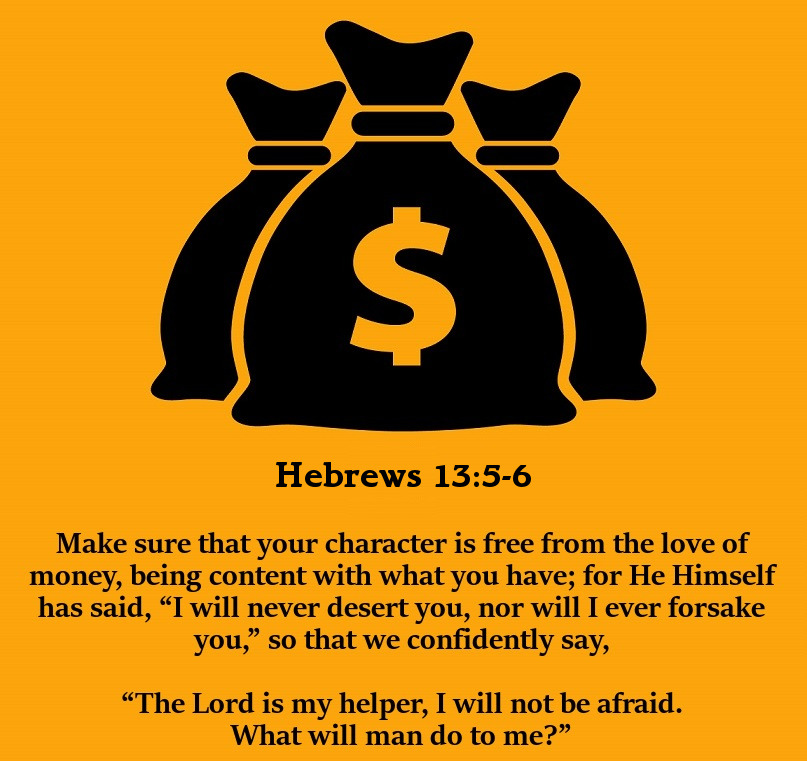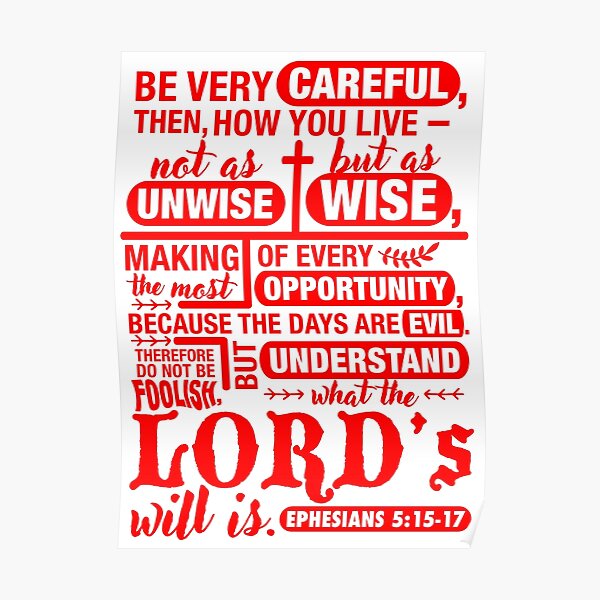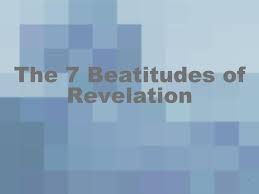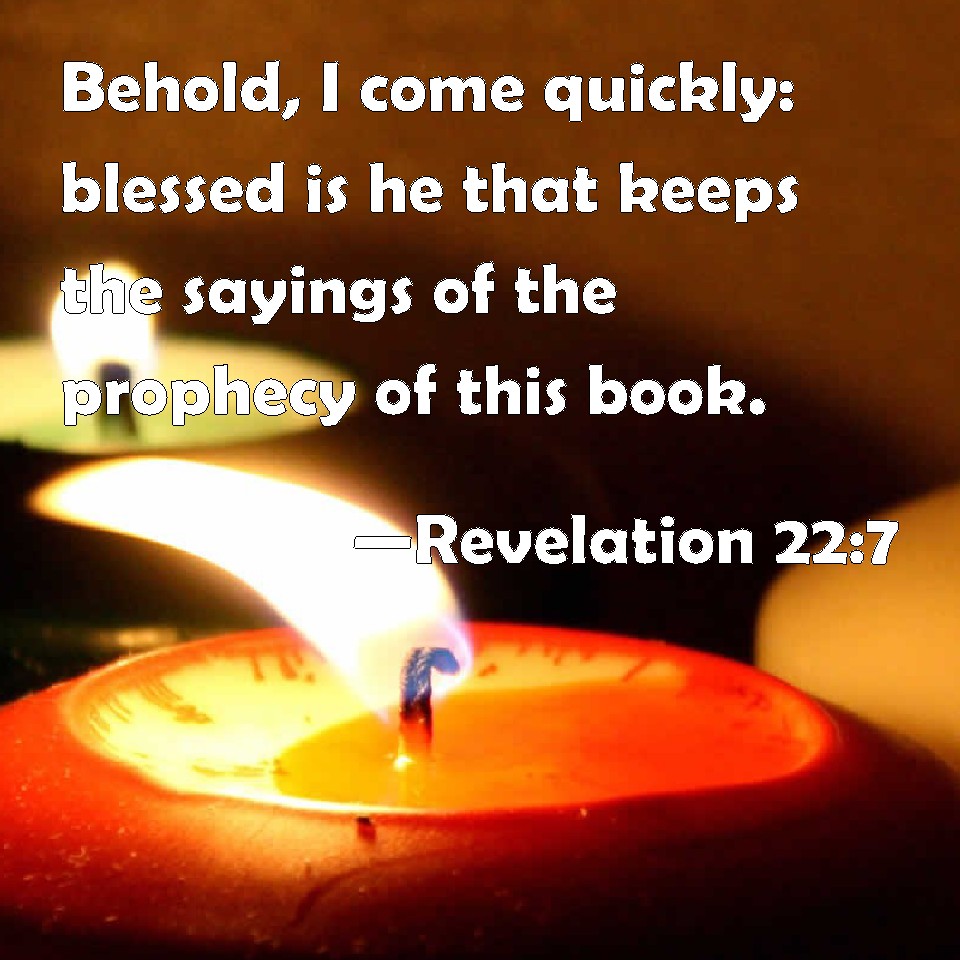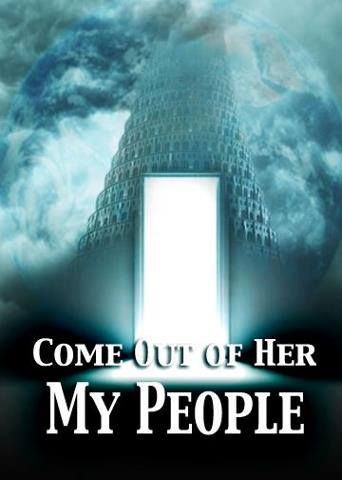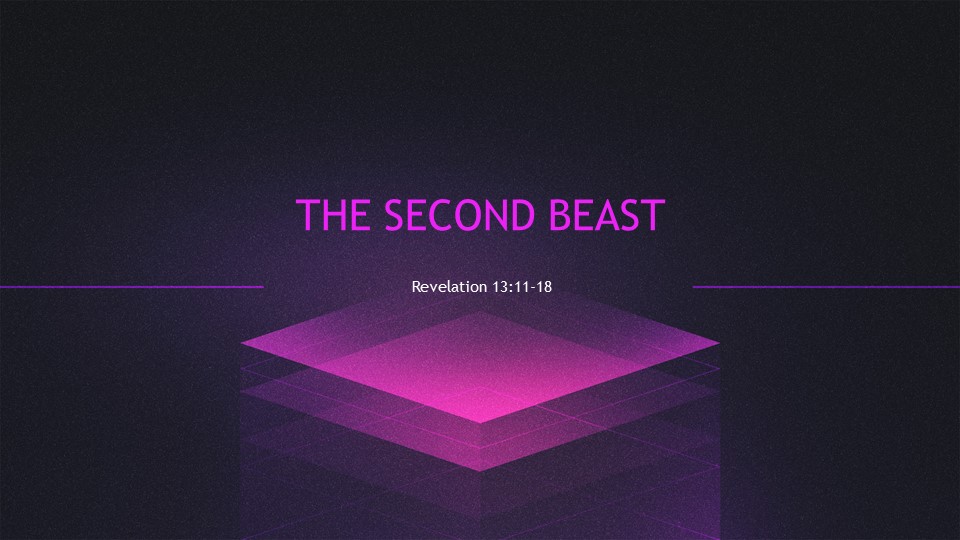Why are Israel and Palestine fighting? This is a question that has been asked many times, but it is more relevant today than ever. There are ideological, political, religious, and spiritual-biblical answers. This article’s focus is on the Biblical perspective.
The true answer goes all the way back to Biblical times. This article will take us back to the beginning of this conflict for a thorough understanding of this event that has affected today’s world.
How it all Began
It all began in Genesis, the book of beginnings. God called Abram out of his country to a land He would direct him to and make him a great nation (Genesis 12:1-3).
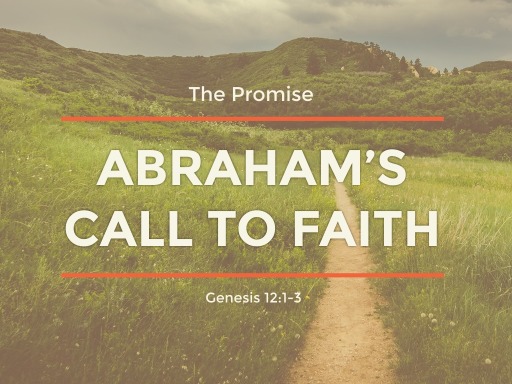
Abram obeyed God, and God made a covenant with him, making him a great nation and the father of many nations. But Abram expressed dismay because he didn’t have an heir. He wondered how he could be a nation when the heir of his estate was his head servant (Genesis 15:2-3). But God expressed to Abram that his servant would not be his heir. Rather, his heir would come through him (Genesis 15:4).
After the institution of the covenant, God changed Abram’s name to Abraham, a father of many nations he would become(Genesis 17:5-6). God also changed Sarai’s name to Sarah, a mother of many nations who told him this son would be born through her. (Genesis 17:15-16). But in his heart, Abraham laughed at the idea that a child would be conceived between Himself and Sarah at their ages, his being a hundred years old and Sarah ninety (Genesis 17:17). Sarah also laughed at this thought (Genesis 18:9-14).
Abraham then inquired of God if his son Ishmael would be the heir. But God insisted that the son would come through Sarah, and his name would be Isaac, and it would be Isaac through whom the covenant would be established. However, He made provision for Ishmael that he would be blessed, fruitful, and multiply greatly (Genesis 17:18-21).
Before this, Sarah suggested to Abraham that he would take her maid, Hagar, as his wife (Genesis 16:1-3). Abraham submitted to her request, and Hagar conceived and produced a son, Ishmael (Genesis 16:15). As mentioned earlier, God made blessed provisions for Ishmael, and he became a great nation. Genesis 17:20 reads, “And as for Ishmael, I have heard you: I will surely bless him; I will make him fruitful and will greatly increase his numbers. He will be the father of twelve rulers, and I will make him into a great nation.” NIV
Subsequently, Abraham resided with his two wives and his two sons, both of whom were blessed. However, trouble arose in the house of Abraham.
Genesis 21:1-3, and 8-14 reads,
1. And the Lord visited Sarah as He had said, and the Lord did for Sarah as He had spoken.
2. For Sarah conceived and bore Abraham a son in his old age, at the set time of which God had spoken to him.
3. And Abraham called the name of his son who was born to him — whom Sarah bore to him — Isaac. NKJV
The Lord fulfilled His promise just as He stated, and the promised child was born.
Genesis 21:8-14 reads:
8. And the child grew, and was weaned: and Abraham made a great feast the same day that Isaac was weaned.
9. And Sarah saw the son of Hagar the Egyptian, which she had born unto Abraham, mocking.
10. Wherefore she said unto Abraham, Cast out this bondwoman and her son: for the son of this bondwoman shall not be heir with my son, even with Isaac.
11. And the thing was very grievous in Abraham’s sight because of his son.
12. And God said unto Abraham, Let it not be grievous in thy sight because of the lad, and because of thy bondwoman; in all that Sarah hath said unto thee, hearken unto her voice; for in Isaac shall thy seed be called.
13. And also of the son of the bondwoman will I make a nation, because he is thy seed.
14. And Abraham rose up early in the morning, and took bread, and a bottle of water, and gave it unto Hagar, putting it on her shoulder, and the child, and sent her away: and she departed, and wandered in the wilderness of Beer-sheba.
We see in verse 9 that Sarah observed Ishmael being the oldest in his late teens at this point, perhaps at play, bullying or mocking Isaac. In any event, Sarah saw Ishmael as a threat to Isaac’s inheritance. Because of what she observed, she forbade Ishmael to share Isaac’s inheritance and ordered Hagar and Ishmael out of the house.
This rivalry in Abraham’s household grieved him greatly, but God assured him in verse 13 that because Ishmael was his seed, he would bless him and make him “a nation.” God also reminded Abraham that Isaac was the more excellent blessed seed. The custom was for the firstborn to receive the highest privilege and blessing. But God’s will overruled that custom. Even though Ishmael was Abraham’s firstborn, Isaac was the blessed seed, the child of the covenant. It was through the line of Isaac that our Lord and Savior, Jesus Christ, came through: the blessed seed of the free woman, not the bondwoman (Galatians 4:21-31). Jesus freed us from the curse, the bondage of the law.
So we see two nations on the horizon at this point: both blessed, but one more incredibly blessed than the other. Did this set up a sibling rivalry?
Two Nations
As we know, Isaac became a great nation by marrying Rebekah and having twins Jacob and Esau. Even though Esau was the oldest twin and had the firstborn’s birthright, Jacob unethically obtained it from Esau (Genesis 25:29-34). He also deceitfully obtained Isaac’s blessing (Genesis 27:1-40).
As time passed, Jacob had a divine encounter at Peniel, and his name was changed to “Israel.” The name means he will rule with God or prince with God (Genesis 32:22-29). This name was symbolic and was later applied to his posterity.
Jacob had twelve sons who formed twelve tribes. These twelve tribes became known as “Israelites,” “children of Israel,” and “house of Israel,” recognizing them clearly as the descendants of Israel through his sons and grandsons. The descendants of the tribe of Judah are also known as Jews.
Because of King Solomon’s sins, God rebuked him, and, upon his death, split the kingdom of Israel into two kingdoms: the Northern Kingdom, which consisted of ten tribes, and the Southern Kingdom, which consisted of the two tribes Benjamin and Judah. Those living in Judah were called Jews. After the Babylonian Captivity, all descendants of Abraham are referred to as Jews.
Ishmael grew up in the desert and became an archer, what became known as an Arab. (Genesis 21:20). Ishmael was the patriarch of the Ishmaelites. This nomadic nation dwelled in northern Arabia.
He married and became the father of twelve sons (Genesis 25:12-16). This ascension fulfilled the prophetic statement from God to Abraham regarding Ishmel: “Behold, I have blessed him, and will make him fruitful, and will multiply him exceedingly; twelve princes shall he beget, and I will make him a great nation (Genesis 17:20).
Of these twelve sons, or Princes, the Scripture says in Genesis 25:18, “His descendants settled in the area from Havilah to Shur, near the border of Egypt, as you go toward Asshur. And they lived in hostility toward all their brothers.”
These descendants were a hostile group. This hostility was handed down from their father, Ishmael. In Genesis 16:12, God also prophesied what Ishmael would become: “And he will be a wild man; his hand will be against every man, and every man’s hand against him; and he shall dwell in the presence of all his brethren.” This verse describes the rude, tempestuous, and aggressive character of the Arabs. However, despite the wild and lawless character of Ishmael’s successors, who would rouse a swarm of enemies against them, they would effectively endure all assaults and remain established in their land. After all, God promised their prosperity. However, this hostility remains unchanged to this day.
Arabs today avow ancestry from Ishmael. He has been quickly and easily suited to Islam as the father of the Arabs. Ishmael is renowned by Muslims as the predecessor of several prominent northern Arab tribes and the sire of Adnan, the ancestor of Muhammad.
The Conflict
There has been animosity between the children of Ishmael and the children of Isaac since the book of Genesis.
Initially, there were no Jewish people. Abram was a gentile living in what today is Iraq. It was an idolatrous nation. God called him out to go to a land where he would show him and give to him to become a great nation (Genesis 12:1-2).
This land turned out to be Canaan. When Abram and his family arrived in Canaan (Genesis 12:5), there was a severe famine in the land, and he continued to Egypt (Genesis 12:9-10). Of the relatives that were with Abram was his nephew Lot. When they left Egypt, they both had great substance and could not remain together, and it was determined that they should separate (Genesis 13:1-12). Abram remained in Canaan.
After the separation was completed, God made a promise to Abram. Genesis 13:14-17 reads:
14. And the Lord said to Abram, after Lot had separated from him: “Lift your eyes now and look from the place where you are — northward, southward, eastward, and westward;
15. for all the land which you see I give to you and your descendants forever.
16. And I will make your descendants as the dust of the earth; so that if a man could number the dust of the earth, then your descendants also could be numbered.
17. Arise, walk in the land through its length and its width, for I give it to you.” NKJV
God promised Abraham and his seed this land some four thousand years ago.
God sealed this promise with a covenant. Genesis 15:18 reads:
18. On the same day the Lord made a covenant with Abram, saying: “To your descendants I have given this land, from the river of Egypt to the great river, the River Euphrates NKJV
This Scripture contains the God-given deed title given to Abram and his descendants: from the Nile River to the River Euphrates. This title deed was to roughly some three hundred thousand square miles. The Israelites were the indigenous people of this land. They were not colonialists, as they originally occupied the land for thousands of years!
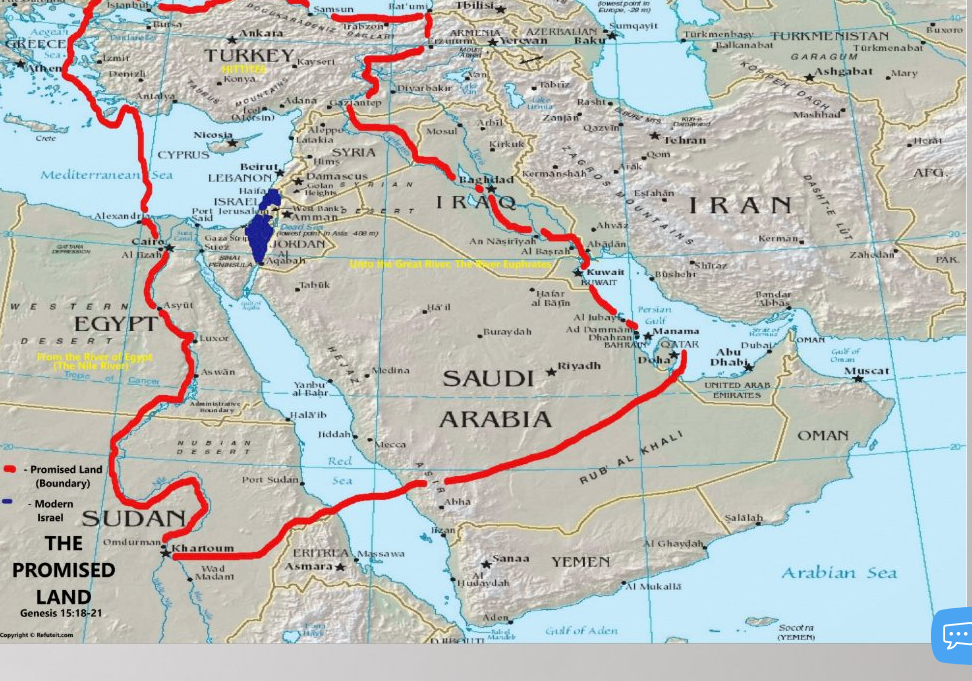
It is important to note that Israel never occupied all of this land. The covenant expressed “from the river of Egypt” (the Nile River). However, the highest point was the Jordan River. Below is the most territory gained under King David.
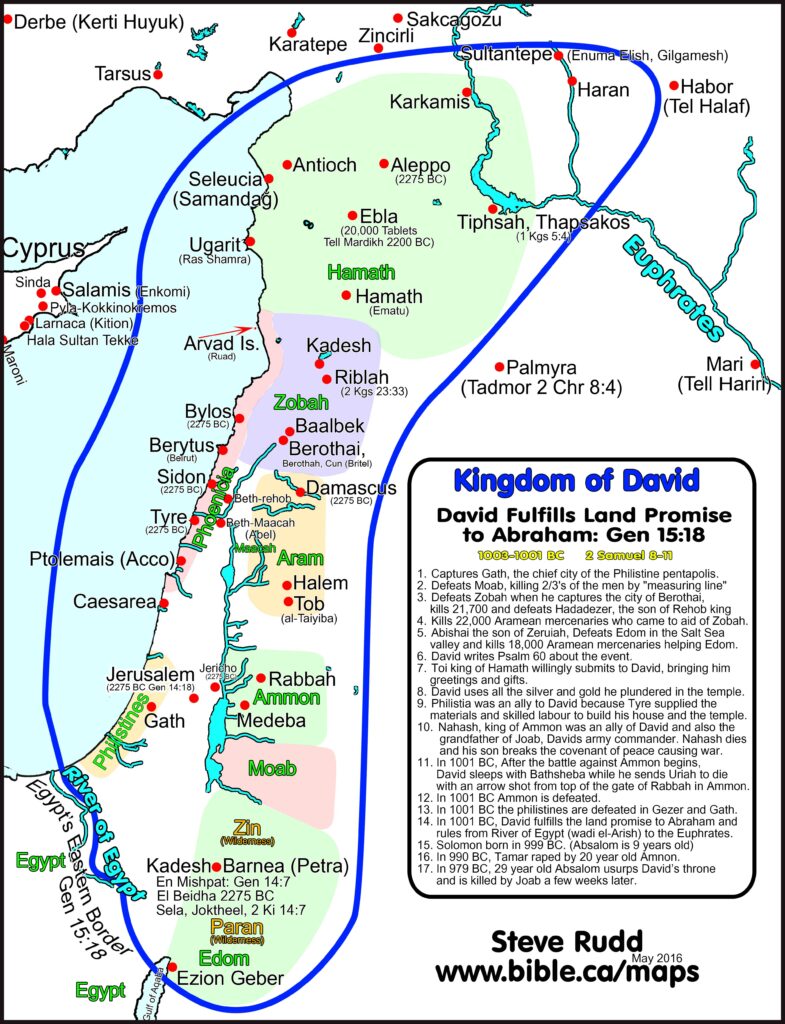
However, as time went on, the nation of Israel fell out of favor with God because of their apostasy. As God charged King Solomon in 1 Kings 9:6-7:
6. But if you or your sons at all turn from following Me, and do not keep My commandments and My statutes which I have set before you, but go and serve other gods and worship them,
7. then I will cut off Israel from the land which I have given them; and this house which I have consecrated for My name I will cast out of My sight. Israel will be a proverb and a byword among all peoples. NKJV
By 586 BC, both kingdoms of Judah and Israel were carried away to exile by the Babylonian king Nebuchadnezzar (1 Chronicles 6:14).
Prior to this, in the seventh century, the Islamic conquest of the Middle East took place, and the Arab people settled in substantial numbers. Except for a somewhat short period of Crusader control, Palestine, as it became known, continued under Muslim dominance for slightly under 12 centuries, with its population vastly Arab.
Where did the name Palestine derive from? In 135AD, The Roman Emperor Hadrian, to quash a Jewish revolt against the Roman Empire, dispersed the Jews from Jerusalem and then he renamed the entire region from Judea to Palestina, which is the Latin term for the Philistines because the Philistines were the perpetual adversaries of the Jews. Hadrian as a way to dishonor the Jewish people after the revolt. [from 135 AD to 1947 the land was called Palestine] The Arabs living in the land were called Palestinians. It’s also important to note that the Jews that remained in the land were also called Palestinians. For any Jew that was born prior to 1948, their birth certificate stated Palestine as their nationality.
After the Israelites were scattered about in exile in 586 BC, nations moved in and occupied the land, i.e., Babylon, Persia, Greece, and Rome. The last empire to occupy the territory before the war was over was the Ottoman Empire, also known as the Turkish Empire. Its official religion was Islam, and it controlled much of Southeast Europe, West Asia, and North Africa between the 14th and early 20th centuries. The empire also controlled parts of southeastern Central Europe from the early 16th to the early 18th century.
In 1516 AD, the Ottoman Empire defeated the Mamluk armies (a military and political group that served Arab and Ottoman dynasties in the Muslim world.)
At the end of WW1, Britain defeated the Ottoman Empire along with the other powers defeated in the war (Germany, Austria-Hungary, and Bulgaria) and took over the territory. In recognition of the suffering of the Jews, in 1917, Britain issued the Balfour Declaration. It was a British Mandate that established a Jewish state or “national home.” Upon commencement of the mandate, the British began to advance the immigration of European Jews to Palestine. During the period between 1922 and 1935, the Jewish inhabitants rose from nine percent to nearly 27 percent of the total population.
This mandate was controversial for a number of reasons. One was, before its release, the British had promised the Arabs independence from the Ottoman Empire in the 1915 Hussein-McMahon correspondence, which was a series of letters that were communicated during World War I where the Government of the United Kingdom agreed to identify Arab independence after the war in exchange for the Sharif of Mecca initiating the Arab revolt against the Ottoman Empire.
As can be imagined, this caused a great deal of hostility and animosity between the Arabs and the Jews, resulting in numerous conflicts and revolts. The boosted Jewish immigration under the mandate generated tensions and violence concerning the Palestinian Arabs and the European Jews.
Without a doubt, the Balfour Declaration generated the conditions for the Jews to regain the land that God deemed to them, even though it was an even smaller fraction of what they were originally promised.
According to the map above, the small dark blue section indicates the sliver of land in conflict that designates modern Israel.
In 1947, the United Nations proposed a partition plan to apportion Palestine into two sections, which would consist of an independent Jewish state and an independent Arab state. Jerusalem, which was declared as a capital by the Jews and Palestinian Arabs, was to be an international territory with a separate status.
While most Jewish leaders received the proposal, many Palestinian Arabs, including those who had been vigorously fighting British and Jewish interests in the region since the 1920s, strongly opposed it.
The Arab leaders contended that they represented most of the population and should be given more territory. Consequently, they began to form volunteer armies throughout Palestine.
In May of 1948, less than a year after the Partition Plan for Palestine was announced, Britain withdrew from Palestine, and Israel declared itself an independent state, implying a willingness to implement the Partition Plan.
However, immediately adjacent Arab armies moved against the Jews to prevent the establishment of Israel as a state. This rapid engagement resulted in the 1948 Arab-Israeli War that involved Israel and five Arab nations: Transjordan (now Jordan), Iraq, Syria, Egypt, and Lebanon. By the end of the war in July 1949, Israel controlled more than two-thirds of the former British reign, while Jordan took control of the West Bank and Egypt took control of the Gaza Strip.
This conflict opened yet another new chapter in the conflict between Israeli Jews and Palestinian Arabs, which at this point became a regional contest involving nation-states and a quagmire of diplomatic, political, and economic interests. It gave birth to the PLO, which was initially committed to the destruction of the State of Israel as a means of attaining its goal of Palestinian statehood and reinstating the land previously ordered under the British Mandate, and which the PLO considered to be occupied illegitimately by the State of Israel.
The conflict has given birth to other organizations of a terrorist nature (e.g., Hamas, Hezbollah, Houthis, etc.) bent on destroying Israel as a nation and a people.
This, all of the above, is why Israel and Palestine are fighting today. Keep in mind that this is an abbreviated version of the modern events concerning this conflict. Numerous events, such as scrimmages and wars, have led to the current situation.
Will there ever be peace in the Middle East? Yes, when Jesus returns.
Conclusion
It is distinctly clear in Scripture that this conflict began some FOUR THOUSAND YEARS ago. It is also evident in Scripture that God intends for Israel to possess their land again. Jeremiah 30:1-5 reads:
1. The word that came to Jeremiah from the Lord, saying,
2. “Thus speaks the Lord God of Israel, saying: ‘Write in a book for yourself all the words that I have spoken to you.
3. For behold, the days are coming,’ says the Lord, ‘that I will bring back from captivity My people Israel and Judah,’ says the Lord. ‘And I will cause them to return to the land that I gave to their fathers, and they shall possess it.'”
4. Now these are the words that the Lord spoke concerning Israel and Judah.
5. “For thus says the Lord: ‘We have heard a voice of trembling, Of terror, and not of peace.
The entire prophecy is contained in Jeremiah 30:1-24. However, these first five introductory verses effectively reflect the will of God. He scattered and led it into captivity, and He will bring Israel back from that captivity, and “they shall possess it.”
Therefore, Israel continues the fight to possess their land. Nations such as the United States and Britain are supporting Israel in this fight. But the time is coming when Israel will be fighting this battle alone. Jeremiah 30:14 NLT reads: “All your lovers—your allies—have left you and do not care about you anymore. I have wounded you cruelly, as though I were your enemy. For your sins are many, and your guilt is great.”
This prophecy initially refers to when the nations of Assyria and Egypt once supported Israel against her enemies but turned against her. However, many prophecies have a double application, and we see this unfolding today. Israel’s allies are increasingly applying pressure to stop the war. Nevertheless, a full read of this prophecy, verses 1-24, reveals that Israel will prevail despite her being left all alone.
The Take Away
There are several takeaways from this episode of Biblical history.
1. There are severe consequences when our faith in God, and His Word in particular, fails. Sarah’s lack of faith in God’s Word led her to take action on her own by presenting her maid to Abraham to bring forth the promised child—the result—a generation that has caused and continues to cause distress to Israel for thousands of years that began in Abraham’s household; a sibling rivalry between two brothers.
We must take heed to the Word of God and obey it, or there will be dire consequences, present and future.
2. God is merciful and will not hold His anger forever, though our sins may be significant. In Jeremiah 3:12, God says through His prophet, “Go and proclaim these words toward the north, and say: ‘Return, backsliding Israel,’ says the Lord; ‘I will not cause My anger to fall on you. For I am merciful,’ says the Lord; ‘I will not remain angry forever. NKJV
God asked Israel to return to Him and repent, and His anger would be no more. Israel has more repentance to do, and God will be responsive.
We also saw God’s mercy with Abraham and his first son Ishmael. Even though he wasn’t the promised child and was conceived out of the will of God, He blessed him anyway because of Abraham.
3. It is vitally important to observe that despite opinions, conventional wisdom, and political views, this is a spiritual situation. This conflict is a spiritual one. Satan fuels the vitriol and animosity against Israel. Antisemitism is satanism—a spiritual war—spiritual warfare personified.
The conflict is based on the promise. Satan knows that Israel is God’s nation and the people of God and that all nations of the earth are blessed through Israel (Genesis 12:3). Jesus the Savior came through Israel. Satan despises the people of God and will do anything to destroy them.
The terror group Hamas has a charter that states its aim is to destroy the Israelites from the face of the earth. This sentiment is the aim of all the terror groups for Israel and its allies.
Opening Paragraph – The Hamas Covenant (1988) “Israel will exist and will continue to exist until Islam will obliterate it, just as it obliterated others before it.”
[Article 7 – The Hamas Covenant] “The Day of Judgement will not come about until Moslems fight the Jews (killing the Jews), when the Jew will hide behind stones and trees.”
However, like it or not, Israel is God’s chosen nation, and it will prevail. Zechariah 12:6 NIV reads, “On that day I will make the leaders of Judah like a firepot in a woodpile, like a flaming torch among sheaves. They will consume right and left all the surrounding peoples, but Jerusalem will remain intact in her place.”
The nations that go against Israel will pay the consequence for disregarding the Word of God that says, “And I will bless them that bless thee, and curse him that curseth thee: and in thee shall all families of the earth be blessed.” [Genesis 12:3]
God’s eye is on the land and the people of Israel and all of those who are His. [Galatians 3:6-9]
Questions, comments, and concerns may be left below.
Blessings!















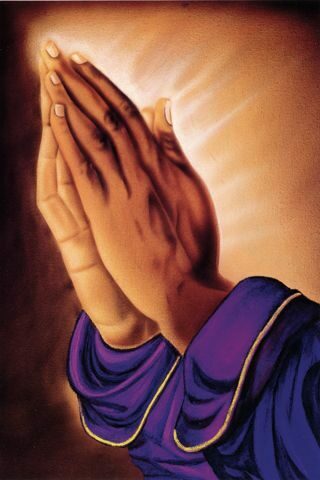


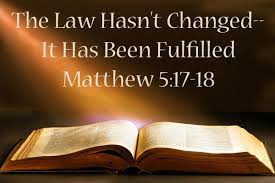

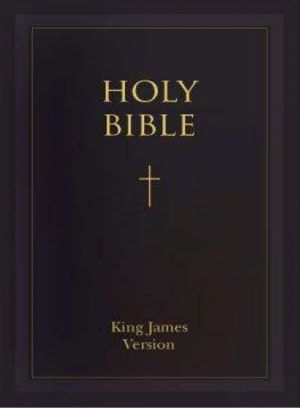
 According to the
According to the 
